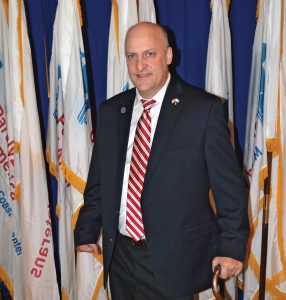Paralyzed Veterans of America held its annual Advocacy & Legislation Training Seminar
By David Zurfluh
This past March, Paralyzed Veterans of America (PVA) held its annual Advocacy & Legislation Training Seminar in Arlington, Va.
The seminar allows PVA members to learn about the organization’s priorities for the year and for them to meet with congressional members. The event includes the PVA national president testifying before a joint session of the House and Senate Committees on Veterans’ Affairs.
I testified before the committee on March 3. It’s the tradition of PN to publish this oral testimony so everyone can become aware of PVA’s legislative priorities. The following is my testimony:
“Chairman (Jerry) Moran (R-Kansas), Chairman (Mark) Takano (D-Calif.) and members of the committees, I appreciate the opportunity to speak with you this afternoon on behalf of the thousands of veterans with spinal-cord injuries and disease [SCI/D] who depend on the VA’s [Department of Veterans Affairs] spinal-cord injury system of care.
“Right now, advocates from our 33 chapters are in Arlington, Virginia, watching this testimony live as they prepare to storm Capitol Hill starting tomorrow [March 4]. My written statement addresses several critical issues that impact catastrophically disabled veterans.
In my limited time, I would like to address three that are particularly important: protection of VA’s spinal-cord injury system of care, improved access to long-term services and supports and increased access to adapted vehicle and housing assistance.
PVA firmly believes VA is the best provider of health care for veterans with spinal-cord injuries and disease. The VA’s SCI/D system of care provides a coordinated life-long continuum of services for veterans that has significantly increased our lifespans. VA’s specialized systems of care follow higher clinical standards than those required in the private sector. We are concerned, however, that if VA continues to understaff facilities, their capacity to treat veterans will be diminished and could lead to the closure of facilities and reductions in service.
Staffing problems have a direct, adverse impact on the SCI/D system of care. PVA estimates there is a shortage of 600 SCI nurses. VA’s ability to meet the highest standard of care to our veterans, however, relies on more than just having the right number of physicians and nurses. They also need qualified and well-trained housekeepers.
Last year, at some VA medical facilities, staffing levels for custodial employees dipped below 50 percent, which heightens the health risks to veteran patients. PVA strongly advocates for Congress to provide enough funding for VA to reform its hiring practices and hire additional personnel to meet demand for services in the SCI/D system of care and ensure the positions, pay and other incentives they offer are competitive with the private sector.
We are also concerned about access to quality long-term services and supports. We were proud to support the [VA] Mission Act’s expansion of VA’s comprehensive family caregiver program to veterans who were seriously injured in service prior to 9/11. VA’s failure to meet congressional deadlines for the expansion of the program, however, means that some of our members will never be able to take advantage of the program because they have died during this delay.
We need you to provide effective oversight to ensure that more of our brothers and sisters who have been waiting for this program are able to benefit before it is too late for them, too.
“Many aging veterans with catastrophic disabilities are also in need of institutional care. VA designated six specialized long-term care facilities because of the unique, comprehensive medical needs of veterans with SCI/D. However, there is only one SCI/D-specific long-term care facility west of the Mississippi. It’s at the Long Beach VA [in California] and it has a capacity of 12 inpatient beds and a long waiting list. Although VA has identified the need to provide more SCI/D long-term care facilities, the need demands greater action on VA’s part and from Congress.
Finally, PVA members seek greater access to adapted vehicle and housing assistance. Access to an adapted vehicle is essential to the mobility and health of catastrophically disabled veterans who need a reliable means of transportation to meet their work, family and health care needs.
Because of the high cost to procure a replacement vehicle, veterans may retain one that is no longer reliable, which places them and those around them at risk. Thus, PVA asks for your support of HR 5761 [the Advancing Uniform Transportation Opportunities for Veterans Act]. This legislation would allow eligible veterans to receive an automobile allowance grant every 10 years for the purchase of an adapted vehicle.
We also seek greater access to housing adaptations, which help catastrophically disabled veterans live in their communities. To improve VA’s Specially Adapted Housing grant program, PVA advocates for an increase in its value and the number of times it may be used, a supplemental grant and prioritization for veterans with ALS [amyotrophic lateral sclerosis].
We are pleased that the House already passed HR 3504 [the Ryan Kules Specially Adaptive Housing Improvement Act of 2019], which would address these concerns.
We also appreciate the Senate companion legislation, S 2022 [the Paul Benne Specially Adaptive Housing Improvement Act of 2019]. We sincerely hope Congress can give final approval to this legislation as quickly as possible.
PVA’s members have the same hopes and dreams as all Americans. Access to quality VA health care, timely benefits and robust services allows us to be unstoppable.
On behalf of Paralyzed Veterans of America, I thank you for your time and will answer any questions you may have.”



